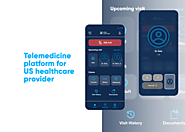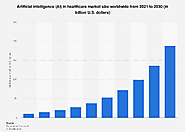-
About
- About Listly
- Community & Support
- Howto
- Chrome Extension
- Bookmarklet
- WordPress Plugin
- Listly Premium
- Privacy
- Terms
- DMCA Copyright
- © 2010-2025 Boomy Labs

Listly by John Smith
Telehealth utilization (EHR & EMR implementation, clinical decision support, document workflow automation) is dynamically revolutionizing conventional healthcare services, which benefits both professionals and patients. Incorporated wisely, computational technology might accelerate service delivery and quality, patient recovery, employee satisfaction and retention, operational performance, and more.

Telemedicine advancements, beginning with audio and video appointments, ending with operational support, have been actively used even before the pandemic, but gained more popularity after the COVID-19 outbreak. Telemedicine solutions have shown noticeable potential to improve patient outcomes during the stress period and are almost indispensable these days.

Healthcare leaders all around the globe are integrating telemedicine applications. These tools minimize human error, thus enhancing patient experience and outcomes. In brief, computational technology can enable greater productivity and provide future-proof foundations, accordingly boosting business profitability.

The global telehealth market size was valued at USD 83.5 billion in 2022 and is projected to expand at a compound annual growth rate (CAGR) of 24.0% from 2023 to 2030.

Telemedicine applications became broader, more intuitive, interactive, and way more accurate and secure – a need that was successfully fulfilled by implementing artificial intelligence.
How can artificial intelligence be applied to expand telemedicine capabilities? Let’s have a look at the main opportunities computer intelligence brings to telemedicine:

AI in healthcare was forecast to undergo significant growth in the coming years from a base value of around 11 billion U.S. dollars in 2021 and is about to reach $188 billion all across the globe by 2030.

Telehealth integration is gaining more momentum, and there are multiple important factors worth noting — increasing morbidity, ever faster aging population, rising prices, personnel shortage, and the COVID-19 crisis. Given the mentioned tendencies, advanced technology can streamline service delivery in many different ways.

Digital therapeutics (DTx) are revolutionizing disease management. Unlike generic health apps, DTx undergoes rigorous clinical and regulatory review, ensuring high efficacy and security standards.
Digital therapeutics help deliver therapeutic interventions using secure, clinically evaluated software products to manage, timely amend, and prevent chronic conditions.